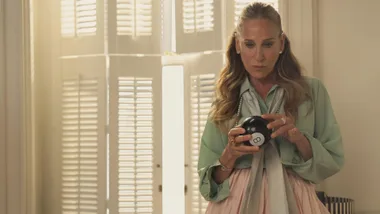When you have a baby, you get lots of stuff. Enough gender-neutral clothing to open an entirely lemon-themed baby store. Muslin wraps for days. Stuff you never knew you needed (or existed), like bath thermometers and nipple guards and breastfeeding pillows. And advice. You get shit tons of advice.
I’ve heard it all. Cool a baby’s fever with vodka (ummmm, no thanks). ‘Cycle’ your baby’s legs to get it to poo (I think I’ll just wait). Get your baby to lick a Dorito so it gets thirsty (you know what? I’ll pass).
But the most advice I ever got was when I went back to work after having my baby.
While most people in my life were nothing but supportive of my decision to return to work after having my daughter, there were quite a few niggling comments that still rankle. When it looked like I was going to have to work full-time when my daughter was 13 months old, some women were quite vocal about hard it would be. “Are you sure?” they asked, as I assured them I was. “But why?” they asked. “Because that’s what the job is,” I answered.

The truth was that I was excited to get back to work. Really excited. I loved my job and I couldn’t wait to start doing it again. I didn’t see it as a choice between my baby and my career – it was simply what I always intended to do: go back to work. I wasn’t prepared for the doubt and judgement I’d face for that decision.
My husband, by contrast, returned to full-time work six weeks after our daughter was born. Nobody ever asked him “who’s looking after the baby”. Perhaps most sadly, nobody asked him how he was coping with not seeing his daughter for a full nine hours a day, and sometimes longer. It was assumed – incorrectly – that he would be fine with this. And it was assumed – incorrectly – that I wouldn’t be.
In my new book, Crazy Busy Guilty, the main character, Georgie, goes back to work when her daughter is six months old. Unlike me, she’s met with outright hostility at the very notion of returning to work. Her best friend, a bit of a helicopter parent, wonders why she’s bothering to go back to work at all. Her mother hands her a cheque for $5000 and tells her that there’s no need for her to work anymore. She will take care of her.
Georgie balks at all of this. She loves her work. She wants to go back – quite desperately, in fact. So she does.
Sadly, in my experience, the negative, outdated assumptions that Georgie faced tend not to come from other mothers, as the well-documented mummy wars might have you believe, but from an older generation of mothers. Many of these women (now grandmothers) didn’t work when they were young mothers themselves – either because they didn’t have to, or because they were not expected to.
Today, many mothers not only have to work for financial reasons (thanks, older people, for all that negative gearing!) but they also want to. We’ve been told that we can be anything, and do anything. And so we’ve worked hard our whole lives to be taken seriously, to stand out, to be promoted. We’ve studied hard at high school and university, and we’ve put in the hours to get what we want at work. And yet, there is still this idea that once a woman has a baby, she’d better not go back to work. The thinking seems to be that once you have a baby, you have everything you need – why would you be so audacious to try to have a career after you’ve already won the life lottery of having a healthy child?
“The question: ‘How do you do it all’ really means: ‘Why do you do it all?'”
Lauren Sams
It’s an idea that’s completely at odds with our world, and yet it persists. Comedian Amy Poehler says that she’s frequently asked where her children are when she goes to studio meetings, as if by going to work she’s completely forgotten about the fact that she has two boys under ten to care for. Indeed, most celebrity mothers are asked about “work-life balance” as part of their red carpet questioning. I wonder how often Brad Pitt or Matthew McConaughey or Chris Hemsworth are asked how they balance fatherhood with mega Hollywood stardom. My guess is: never.
As Georgie quickly discovers, the assumption behind questioning women how they manage it all is that they shouldn’t have to. The question isn’t really “How do you do it?”, it’s “Why do you do it?”
We are one of the first generations of women to have a real choice between staying at home with our children, and going back to work. I consider that choice a privilege. Of course, I don’t begrudge women who want to stay at home with their kids. That is their choice and I think it’s a valid one. But it’s not the only one, and to hold up stay-at-home mothers as some sort of beacon of perfect motherhood is wrong. There is no such thing as perfect mothering.
I love working – I always have. To some extent, it defines who I am. To have that wrested away from me – permanently – would have far-reaching consequences, not just for me, but for my family, including my daughter. I’m proud when I tell her that I love my job, and we often talk about what she will be when she grows up. Right now, she’s set on being “a doctor, a nurse and a midwife” (yes, all at once). Obviously, I think she’s the smartest child who ever lived and I fully believe she can do all of this. I don’t want to just give her lip service about what she’s capable of. I want her to believe that she can pursue the career of her dreams – not just now, at four, but also when she’s 24, and 34, and 44 and older. I want her to know that it’s possible, even if she chooses to have a child.
And if she ever asks me why I did it all, I’ll tell her the truth: because there’s no way I couldn’t.
Lauren Sams’ book Crazy Busy Guilty (Nero Books) is out in January 2017. She is also the author of She’s Having Her Baby
 Getty
Getty









